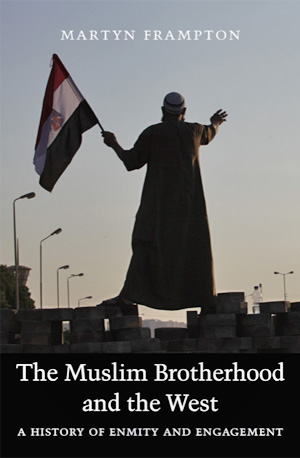
This book examines the history of the relationship between the Muslim Brotherhood—the world’s most important Islamist movement—and the Western powers that have dominated the Middle East over the last century—the British and the Americans. The subject, which is touched upon in other works, but here is made the central prism of analysis, continues to have contemporary resonance; the conspiracy theories that surrounded Brotherhood-western relations during the Arab Spring, for example. But, to be clear, this is not a book about the Arab Spring per se. My narrative arc reaches from the founding of the Brotherhood in 1928 down to 2010; the entire history of the relationship is crucial for understanding events that came after 2011.
For a brief period, it seemed as if the Muslim Brotherhood and other Islamist movements would emerge as the real “winners” from the Arab Spring. The question of their relationship with “the West”, both at a practical and intellectual level, rose to the top of the political agenda. Both sides came to this issue with accumulated historical baggage that explains some of the choices they made.
The Brotherhood, from its beginnings, saw the West as the critical “other” by which it defined its own “self”. The founder of the Brothers, Hasan al-Banna, was really a man of his time. His writings reveal that he saw changes around him in Egyptian society, and that he associated those changes with “the West”. Al-Banna, it seems clear, was profoundly disturbed by the broader process of socio-cultural change—what we tend to label ‘modernization’—and in particular, by the growing secularization of his country. To his mind, this process had been unleashed by the western powers, with the deliberate intention of destroying Islam, so as to cement their own power. Al-Banna created the Muslim Brotherhood in order to challenge this process. Its worldview comprised a unique form of anti-imperialism, which blended opposition to western political power, with a socio-cultural project centered on the politics of authenticity. In the context of 1930s and 1940s Egypt, this proved to be a potent admixture (for reasons explained in the book); and from then on, the Brothers have been a critical part of the Egyptian, and wider Middle Eastern, socio-political fabric.
The western powers that exerted primary influence over Egypt and the wider region could not, for those very reasons, ignore the Brotherhood. The British and later the Americans paid close attention to the movement and debated its character and role. The book traces the contours of that debate as it evolved over the years down to the Arab Spring and provides an important case study of Anglo-American policy-making, both in the Middle East and more broadly. In all this, I would hope readers find an empirically rich, yet engaging account of a story that, until now, has reached only marginal attention.
In examining the evolving relationship between the West and the Brotherhood from the perspective of both sides, I was conscious of the fact that my subject did not fit easily within established historiographical boxes. I tried to engage with a range of literatures. First and most obviously, I hoped to provide a new perspective on the history of the Brotherhood itself and the worldview of Islamism more broadly. In this regard, the works I aspired to emulate were those classic studies of the Brotherhood by scholars like Richard Mitchell and Brynjar Lia. The first objective I set myself with this book was to understand better the mindset of the Brothers—to comprehend how they viewed the world.
Secondly, I think the book offers an insight into Anglo-American foreign policy-making towards Egypt, and in the Middle East generally, during the “long” twentieth century. One of the key themes of the book is the way in which the British and the Americans have deployed a particular “language of diplomacy” when trying to secure their interests. At the core of this is the effort to uncover, or anoint “moderates” with whom they can work, as opposed to “extremists” who were to be opposed or defeated. Reflections on the Brotherhood were usually framed with this paradigm in mind. And where once it was almost invariably classed as an “extremist” organization, latterly there have been a number of debates about its putative “moderation”. Often, these debates have involved a kind of “Kremlinology”—the attempt to delineate internal “moderates” and “extremists” within the Brotherhood. In all of this, we can learn something important about the Anglo-American method of foreign-policy making and force projection. And in this regard, my book built on important insights from scholars like Robert Holland and John Darwin (in the British context), and Matthew Jacobs and Peter Hahn (for the US). Relatedly, the book also offers a perspective on how both the British and American governments have considered ‘Islam’ in policy terms—and in so doing, builds on recent invaluable studies by William Inboden and Andrew Preston.
The book ended up longer than I anticipated—in part because the evidence that I accumulated in Cairo, London, and Washington, proved to be so rich and the story so compelling (and because I had a very tolerant and sympathetic editor at HUP!). Partly because of this, I took care to make sure that the introduction and conclusion, if read together, provided succinct but thorough overviews of the key themes that run throughout the book. I thought back to my days as an undergraduate, when often, it was the only part of a book I had time to digest, and I wanted to make sure that someone with limited time, or perhaps just browsing, could glean the essentials from those critical chapters.
Beyond that, I think readers will be guided in their approach by those areas of greatest interest to them. Chapter 8, for example, which covers the period from 1989 down to 2010, is of the greatest immediate chronological relevance to those considering contemporary policy challenges. Conversely, those wanting to understand in greater depth, the way that the Brotherhood thinks about “the West” will want to read Chapter 1, which deals with this issue during the formative era of the group. (One of the insights of the book is the remarkable degree of ideological continuity that the Brotherhood demonstrates on this issue.)
Personally, Chapter 2 was perhaps the section of the book I enjoyed writing the most. This covers the period 1940 to 1944, and examines the debates taking place among British officials—both political and military, in Egypt and in London—over the Brotherhood, and the best way of dealing with them. Particularly interesting to me was tracing the genesis of a strand of thinking within officialdom that later became far more widespread. This favored engagement with, and perhaps even patronage of, groups like the Brotherhood—on the assumption that they might thereby be tamed, and perhaps even brought to “moderate” or “liberalize” their behavior. In the 1940s, that viewpoint does not prevail, but it is fascinating, I think, to hear it being debated at that time. So, I would perhaps recommend this chapter as a good snapshot of the book’s substantive content.
The book is written first and foremost as a work of academic history, and I endeavored to maintain the highest standards of rigor and objectivity. Equally, though, I was only too aware that its subject matter is of direct political relevance today, and that the policy debates I examined in the latter sections of the book remain “live”. I hope that the book can offer a fresh perspective on those more contemporary debates.
Moreover, I think the issues that are at stake are likely to be of enduring importance. The outworking of the Arab Spring has encouraged a view in some quarters, I think, that the Muslim Brotherhood and its brand of “mainstream” Islamism has been eclipsed. It is tempting to think that it has been overtaken by more exotic, violent groups like ISIS. Equally, the Brotherhood’s removal from power in Egypt could be seen as marking the end of the movement as a socio-political force. And yet, there are reasons to hesitate from making such a judgment. The Brotherhood has a long history of surviving repression, and while it may not reappear in exactly the same form as previously, it may be premature to write its epitaph. For this reason, western policymakers and analysts will likely still have to confront the challenge of dealing with the Brotherhood—or a movement of its ilk. That being the case, I think they can be well serviced by a better appreciation of the historical relationship between the West and the Brotherhood of the kind on offer here.
Within the academy, meanwhile, I hope the book will be seen as a useful contribution to the literature on the Brotherhood, and that it opens up further lines of inquiry into the subject. There is still so much that scholars have yet to explore about this group; it is striking that the book everyone still refers to as seminal, was Mitchell’s 1969 study. Without in any way wishing to diminish the importance of that brilliant book, I think this speaks to the gaps that remain to be filled, notwithstanding the invaluable efforts of scholars like Carrie Wickham, Hazem Kandil, Khalil al-Anani and Beth Baron. My own book can hopefully be read as providing important insights into an otherwise neglected dimension of the Brotherhood’s history.


Martyn Frampton is Reader in Modern History at Queen Mary University of London. His research interests include the politics of Islamist movements, Anglo-US foreign policy in the Middle East, and modern Irish history. He is the author of four books and numerous articles. His earlier works were focused primarily on ‘the Troubles’ in Northern Ireland and, in particular, the history of the Irish republican movement. Latterly, he has expanded his research ambit, learning Arabic and focusing on the history of the Muslim Brotherhood.